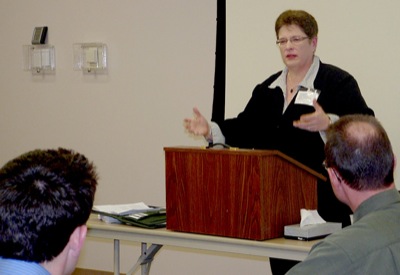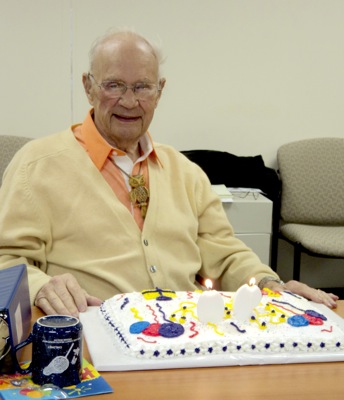Wednesday, April 13th, 2011
Spell high morale: R-E-S-P-E-C-T
WSU communication professor speaks to business leaders
By Christine Henderson

Photo by Christine Henderson/The Daily Standard
Sharon Showman, instructor of communication and religion at Wright State University-Lake Campus, speaks at the Business Person's Breakfast sponsored by St. Marys Community Public Library.
ST. MARYS - A Wright State University-Lake Campus professor offered a solution to poor productivity and high staff absenteeism and turnover - make employees feel valued.
Sharon A. Showman, professor of communication and religion, addressed employee morale during the Business Person's Breakfast on Thursday sponsored by St. Marys Community Library.
Showman detailed the following data:
Of 5,000 U.S. households, only 45 percent were satisfied with their jobs, down from 61 percent in 1987, showed a 2010 survey by the Wall Street Journal Online.
Another study, done by MetLife and recently quoted in USA Today, showed employee loyalty is at a three-year low, but many employers are not aware of the morale meltdown.
Four in 10 employees say a heavy workload, unrealistic job expectations and long hours have created stress, reported the American Psychological Association.
Also contributing to low morale is the public knowledge of the large disparity between top management salaries/bonuses and workers' incomes, Showman told about 45 area business people.
The national trend is born out in a survey Showman conducted with WSU students. About two-thirds described employee morale at their current or past job as fair or poor.
Many employees are seeking new jobs, which soon will cost companies in productivity and expenses for recruiting and training, Showman quoted Metlife.
Other results of low morale are negativity in the workplace and increased conflicts, high absenteeism and tardiness, low level of performance, sabotage, poor customer service and lost business, Showman said.
The professor's solution for the low morale - give each employee a bike.
Ikea USA store gave each of its 12,400 employees a surprise bicycle at the end of the year as a thank you. The bike had no company logo. The result was more productivity and teamwork, she said.
In a smaller company, a president personally makes breakfast regularly for the entire workforce.
"His employees will follow him to the ends of the earth for a waffle," Showman said.
One person is assigned full time at another business to finding staff doing the right thing. When "caught," an employee receives a personal note from the chief executive officer and a basket of flowers, Showman said.
Almost two-thirds of the surveyed WSU undergraduates said they wanted the boss to show he/she "cared about me as a person," Showman said. A person's personal and professional lives combine to impact how that worker does his/her job, she added.
In general, the professor recommended managers recognize appropriate special events in employees' lives, listen to people, recognize and praise good work, give incentives, communicate, reprimand in private, do not yell, avoid favoritism and deal with dysfunctional/negative workers, encourage personal and professional development, give employees a sense of autonomy and foster consistency in management.
Having the boss show respect was one of the most often cited requests, she emphasized.
"The one thing I want you to take away," Showman told the business people, "is that you remember how you like to be treated."


